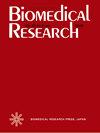Prevalence of prehypertension and its association with obesity and lipid parameters in medical students.
IF 1.3
4区 医学
Q4 MEDICINE, RESEARCH & EXPERIMENTAL
引用次数: 0
Abstract
Background: Medical field is said to be associated with a lot of stress, both mental and physical. And medical students suffer more because during their training period they undergo a lot of stress in the form of little physical activity, altered food habits and social habits like smoking and alcohol. For this reason we decided to conduct this study amongst the medical students. Objective: Our objective of this study is to determine the prevalence of prehypertension among Medical college students and study the association between prehypertension and other cardiovascular risk factors like lipid profile and Body Mass Index (BMI). Methods: A total of 300 medical students of first to final year MBBS (18-23 years) were selected randomly for this study. Each participant’s data was collected, BMI calculated. BP was measured by a mercury sphygmomanometer. Subjects were classified as 3 groups Normotensive, Hypertensive and Prehyperensive. Blood samples were collected and Fasting plasma glucose, serum cholesterol, triglyceride and HDLc, were estimated by using commercially available kits in automated analyzer. Serum LDLc, and VLDLc (Very Low Density Lipoprotein-cholesterol) were calculated by Friedwald's equation. All the data were analysed by using SPSS software. Results: The overall prevalence of PHT was 38%. Prevalence of prehypertension is more in females. Among the students 75% had normal BMI, 20% were overweight, 3% were obese and 2% were underweight. BMI of Prehypertensive was significantly more than the normotensive students. BMI of female students are more than the male students. Among the lipid parameters, prehypertensives showed significant increase in TC, TG, LDLc than normotensive students. TC, TG, LDLc were high for female students than male students. Total prevalence of dyslipidaemia was 17.4% out of which 14.9% was hypercholesterolemia, 8.15% was hypertriglyceridaemia, 5.6% had high LDLc level and 10.4% had low HDLc level. There was a significant positive correlation between SBP with BMI, TG, TCh and VLDLc and significant positive correlation between DBP with TG and LDLc. There is negative correlation of SBP and DBP with HDLc. This might point out the contributory role of dyslipidemia and obesity towards prehypertention. Conclusion: Prevalence of prehypertension was high and associated with a higher BMI and dyslipidemia .Prevalence of dyslipidemia is 17.4%. Hypercholesterolemia is more prevalent. Students should change their life style. They should do yoga, meditation regularly to cope with stress. They should avoid oily foods to decrease cholesterol level.医学生高血压前期患病率及其与肥胖和脂质参数的关系
背景:据说医学领域与很多压力有关,无论是精神上的还是身体上的。医学生的痛苦更大,因为在他们的训练期间,他们经历了很多压力,形式是很少的体育活动,改变的饮食习惯和社会习惯,如吸烟和饮酒。出于这个原因,我们决定在医学生中进行这项研究。目的:本研究的目的是确定医学院学生高血压前期的患病率,并研究高血压前期与其他心血管危险因素如血脂和体重指数(BMI)的关系。方法:随机抽取MBBS一至四年级医学生300名,年龄18-23岁。收集每个参与者的数据,计算BMI。用水银血压计测量血压。将受试者分为正常、高血压和高血压前期3组。采集血样,使用市售试剂盒在自动分析仪中测定空腹血糖、血清胆固醇、甘油三酯和HDLc。血清低密度脂蛋白(LDLc)和极低密度脂蛋白-胆固醇(VLDLc)由弗里德瓦尔德方程计算。所有数据采用SPSS软件进行分析。结果:PHT的总患病率为38%。高血压前期的患病率在女性中更多。75%的学生BMI正常,20%超重,3%肥胖,2%体重不足。高血压前期学生BMI明显高于正常学生。女生的BMI高于男生。血脂指标中,高血压前期学生的TC、TG、ldl均明显高于正常血压学生。女生TC、TG、LDLc均高于男生。血脂异常的总患病率为17.4%,其中高胆固醇血症14.9%,高甘油三酯血症8.15%,高ldl水平5.6%,低hdl水平10.4%。收缩压与BMI、TG、TCh、VLDLc呈显著正相关,舒张压与TG、LDLc呈显著正相关。收缩压、舒张压与HDLc呈负相关。这可能指出血脂异常和肥胖对高血压前期的促进作用。结论:高血压前期患病率高,且与BMI和血脂异常有关,血脂异常患病率为17.4%。高胆固醇血症更为普遍。学生应该改变他们的生活方式。他们应该经常做瑜伽、冥想来应对压力。他们应该避免油腻的食物,以降低胆固醇水平。
本文章由计算机程序翻译,如有差异,请以英文原文为准。
求助全文
约1分钟内获得全文
求助全文
来源期刊

Biomedical Research-tokyo
医学-医学:研究与实验
CiteScore
2.40
自引率
0.00%
发文量
19
审稿时长
>12 weeks
期刊介绍:
Biomedical Research is peer-reviewed International Research Journal . It was first launched in 1990 as a biannual English Journal and later became triannual. From 2008 it is published in Jan-Apr/ May-Aug/ Sep-Dec..
 求助内容:
求助内容: 应助结果提醒方式:
应助结果提醒方式:


